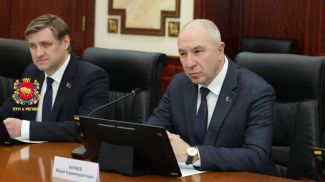MINSK, 14 June (BelTA) – Newcomer countries are interested in Belarus' experience of implementation of the nuclear energy program. Oleg Sobolev, a consultant with the Nuclear and Radiation Safety Department of the Belarusian Emergencies Ministry (Gosatomnadzor), mentioned it at a media briefing held in BelTA's press center to discuss new trends in the global nuclear safety regime for Belarus.
Oleg Sobolev said: “Other countries and international organizations more and more often contact Belarus in order to study our experience of development of nuclear and radiation safety infrastructure on the basis of modern requirements of the International Atomic Energy Agency (IAEA). We noticed this trend about five years ago when regulatory bodies of individual countries started contacting us. Back then we were in the process of developing our own nuclear energy program and respectively the regulatory component. But we already had queries from Egypt, Bangladesh, Vietnam, and Hungary.”
In his words, foreign specialists wondered how oversight during the construction of the Belarusian nuclear power plant is carried out, how safety is evaluated, and how licensing is done. “Let me remind you that all the stages of the lifecycle of a nuclear installation need licenses – deployment, construction, operation, and decommissioning. We also gave licenses and individual permissions virtually for every stage of the commissioning process – physical launch, reactor power startup, and pilot commercial operation,” the consultant explained.
As for Hungary, the country already has an existing nuclear power plant but it intends to build two new nuclear power plant units. “Their nuclear project developed in totally different conditions. It is likely that the people, who took care of it, have already retired. Meanwhile, Belarus is implementing the project now, this is why our experience is interesting,” Oleg Sobolev added.
“Due to the same reason other newcomer countries, which think about or have already started making the first few steps in the course of implementing nuclear energy programs, contact us. Yes, there is Russia, the United States, France, UK, and Japan. Those countries have powerful nuclear industries. But these countries started developing their nuclear energy industries a long time ago in totally different starting conditions and with totally different safety requirements – way before the Chernobyl nuclear power plant accident and the accident at the Fukushima nuclear power plant. Now all these lessons of the accidents have been taken into account, documented, and implemented into new IAEA safety standards,” Oleg Sobolev noted.
“Belarusian experience is growing increasingly used by other countries. This trend will grow stronger. We turned out to be quite a successful newcomer. We've managed to go all the way from deciding on building a nuclear power plant to the commercial operation of the nuclear power plant,” Oleg Sobolev concluded.













